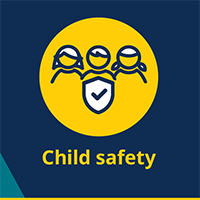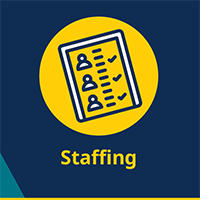On this page
Regulatory priorities emerge from the Regulatory Authority’s environmental scan which, collaboratively with sector stakeholders, explores emerging issues, root causes and risk factors.
The Regulatory Authority expects to see providers comply with their responsibilities. Supporting resources for the 2025–2027 priorities are outlined below.
Child safety

Why this is a priority
Child safety is of paramount importance and is being strengthened through updates to the National Quality Framework (NQF) resulting from the Child Safety Review, as well as Queensland's Child Safe Standards and the Reportable Conduct Scheme. Ensuring children’s safety is essential so adequate controls need to be in place to prevent serious incidents and protect children.
Approved providers play a vital role from recruitment onwards, by ensuring that educators consistently follow thorough, child safe policies and procedures. As more children display complex needs and behaviours, educator must engage with all children in ways that are positive, respectful and safe, because every interaction counts.
Consider
- Staying informed of, and implementing, new legislative requirements and child safety initiatives keeps children safe and protected.
- Training and consistent application of
policies and procedures helps to protect children; ensure you regularly review and update to meet the latest requirements.
- The steps you take to prevent and respond to inappropriate interactions; educators' positive interactions with every child enhance their relationships and children’s wellbeing.
More information
Staffing

Why this is a priority
Competent, capable and well-supported staff are critical to the delivery of high-quality education and care. Compliance and service quality is compromised when staff are not appropriately qualified and experienced, adequate in number, and familiar with the service’s practices and the needs and interests of the children they are working with.
Ensuring child safety starts right from the point that staff are recruited, so be sure your screening processes are robust. Effective leadership should be in place to ensure that staff are properly inducted, adequately supported, and effectively overseen in their practice.
Consider
- Staff the service with people who have appropriate skills, qualifications, and experience.
- Comprehensive induction and ongoing training for all staff, including agency staff.
- Consistent monitoring of staff practices to ensure compliance and drive continuous improvement.
- Strengthen leadership of nominated supervisors, responsible persons, and coordinators so they can manage compliance, quality, and operational requirements effectively.
More information
Outdoor space

Why this is a priority
Most incidents in early childhood settings occur in outdoor areas, including accidents and incidents of children leaving the premises. Thoughtful outdoor design supports active, child-led play and enables staff to supervise effectively. When combined with quality educational programs that make full use of outdoor environments and natural elements, these spaces can positively influence children’s behaviour and engagement.
The focus on outdoor spaces should begin in the design phase before a service commences and extend into ongoing operation and maintenance.
Consider
- Outdoor spaces designed to allow children to explore and experience nature and active play support children’s wellbeing and aid supervision.
- Risk management, upkeep and functionality are essential to ensure children’s safety in outdoor spaces.
- Quality programming for outdoor spaces helps keep children meaningfully engaged, reducing the likelihood of incidents and children leaving unnoticed.
More information